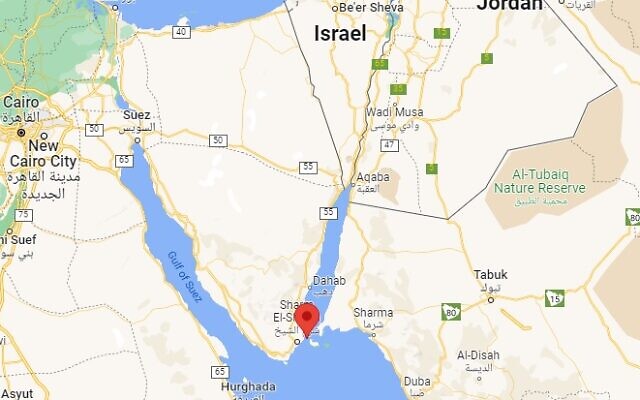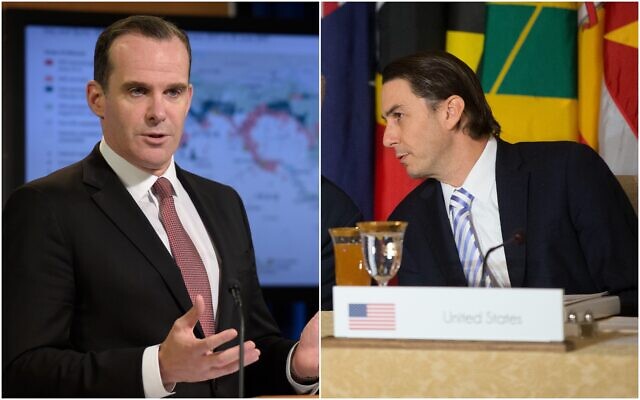
Businesspeople, entrepreneurs fly to kingdom on Israeli passports with special entry visas for talks on deals and investments, according to Globes
Dozens of Israeli tech entrepreneurs and businesspeople recently flew to Saudi Arabia for advanced talks on Saudi investments in Israeli companies and Israeli investment funds, according to a report (Hebrew) in the Globes business daily.
Israel and Saudi Arabia do not have official diplomatic relations, but covert ties have warmed in recent years as the Saudi crown prince, Mohammad bin Salman, has reportedly seen Israel as a strategic partner in the fight against Iranian influence in the region.
The kingdom refrained from signing onto the Washington-brokered Abraham Accords in 2020 as the US and Israel had hoped, but Riyadh is believed to have given the go-ahead to Bahrain, where it retains decisive influence, to join the normalization agreement with Israel alongside the United Arab Emirates, Morocco and Sudan.
The businesspeople and entrepreneurs who made recent visits to Saudi Arabia entered the kingdom on their Israeli passports containing special visas, according to Thursday’s Globes report.

The Saudis have also expressed interest in Israeli medical and health tech solutions, as well as Israeli “products,” the report said without elaborating.
The report comes weeks after Saudi Arabia was said to be planning to allocate millions of dollars for investments in Israeli tech companies via Jared Kushner’s new private equity firm.
Kushner, the son-in-law of former US president Donald Trump and an ex-senior adviser, set up Affinity Partners late last year, raising some $3 billion in committed funding from international investors, including the Saudis.

A Wall Street Journal report in early May said Riyadh has eyed two Israeli companies for investment, though the names of the firms were not disclosed, nor the sectors in which they operate. The report said the investment was “the first known instance that the Saudi Public Investment Fund’s cash will be directed to Israel, a sign of the kingdom’s increasing willingness to do business with the country, even though they have no diplomatic relations.”
According to the Globes report Thursday, Israeli businesspeople have, for months, been flying to Saudi Arabia on special entry visas at the invitation of Saudi entities. They have visited the capital Riydah and also Neom, a Red Sea town where the kingdom has big plans to incorporate smart city technologies that could include Israeli solutions. Neom is part of the kingdom’s Saudi Vision 2030, a national blueprint for economic, social, and cultural advancement.
In late 2020, former prime minister Benjamin Netanyahu and ex-Mossad chief Yossi Cohen, alongside other Israeli officials and then-US secretary of state Mike Pompeo, were said to have visited the city to meet with the crown prince, in the first known high-level meeting between an Israeli and a Saudi leader.

Netanyahu and Cohen had traveled to Saudi Arabia on the private plane of businessman Ehud Angel — the same jet that the then-prime minister used for a covert visit to Oman in 2019, according to public broadcaster Kan.
Saudi sources in the Globes report Thursday said authorities have seen an uptick in local requests to host Israeli businesspeople in the kingdom.
US officials in Riyadh
Separately, an Axios report last week said that pair of senior US officials traveled to Saudi Arabia for covert talks on an agreement that could boost Washington’s ties with Riyadh while also bringing the kingdom closer to normalizing relations with Israel.
US National Security Council Middle East coordinator Brett McGurk and State Department energy envoy Amos Hochstein arrived in Saudi Arabia on Tuesday for the meetings with senior Saudi officials, Axios reported, citing three current and former US officials.

Two days earlier, Axios reported that the Biden administration was brokering talks aimed at finalizing the transfer of the Red Sea islands of Tiran and Sanafir from Egypt to Saudi Arabia.
In 2017, Egyptian President Abdel-Fattah el-Sissi ratified a treaty that would see the islands handed over to Saudi Arabia. The deal withstood protests and legal challenges in Egypt but was never finalized.
The two Red Sea islands figure prominently in the Israeli-Egyptian peace agreement signed in 1979, which promises safe passage to Israeli civilian and military ships through the narrow waterways of the Straits of Tiran.

As part of the 1979 deal, Egypt agreed to demilitarize the islands and allow the presence of a force of multinational observers led by the US to patrol them. Their transfer to Saudi Arabia, therefore, requires a degree of Israeli buy-in in order to move forward.
The Straits of Tiran are Israel’s only water passage from Eilat to the Red Sea, allowing for Israeli shipping to and from Africa and Asia without requiring passage through the Suez Canal, as well as passage from Eilat to and from the Suez Canal for Mediterranean trips.
Nonetheless, Israel offered its approval in principle for the island transfer, while conditioning it on finding an agreed-upon solution regarding the multinational observer force, Axios reported, citing US and Israeli sources.

The multinational squad turned into a main sticking point in the talks, as Riyadh agreed to keep the islands demilitarized while thus far rejecting such a force on its territory, the report said. Riyadh instead offered a commitment to maintaining full freedom of navigation for ships through the Straits of Tiran.
Israeli negotiators showed willingness to forgo the multinational force but asked for alternative security arrangements, according to the report.
Jerusalem is also asking that Saudi Arabia take a number of steps toward normalizing ties with the Jewish state — namely allowing additional Israeli flights to use Saudi airspace and allowing direct flights between Israel and Saudi Arabia so that Muslims can easily travel to the holy cities of Mecca and Medina from Ben Gurion Airport.
Source: The Times of Israel